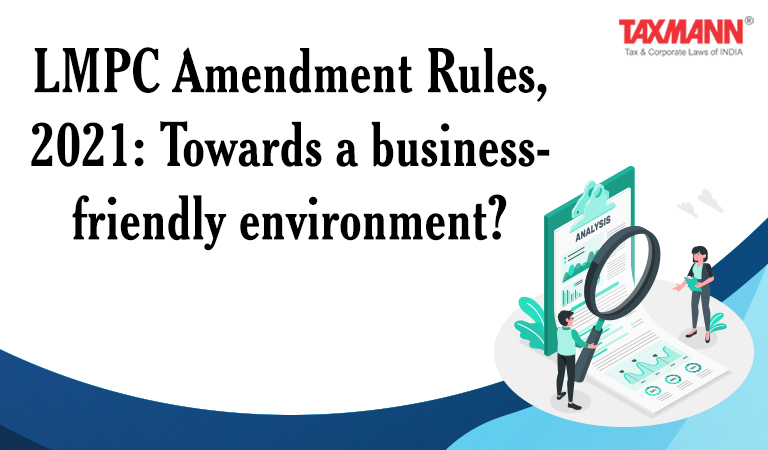LMPC Amendment Rules, 2021: Towards a business-friendly environment?
- Blog|News|Company Law|
- 2 Min Read
- By Taxmann
- |
- Last Updated on 19 November, 2021

[2021] 132 taxmann.com 151 (Article)
In an effort to boost its ease-of-doing-business rankings, the government has been actively involved in the last few years to make the legal compliances effortless and unhindered (at least on paper). As far as the labeling laws under the legal metrology law is concerned, it has time and again been seen that the manner of writing is given utmost importance by the concerned authorities. A slight use or non-use of a ‘comma’ or an insertion or non-insertion of space between characters or numbers has often led to it being construed as a violation under the Legal Metrology law and subsequently, action is initiated against the concerned businesses. Consequently, a strict interpretation of the law often leads to countless practical difficulties and unwanted nuances in respect of declarations to be made on a pre-packaged commodity. In an effort to overcome such difficulties, the Ministry of Consumer Affairs, Food and Public Distribution (Department of Consumer Affairs) vide its Notification G.S.R. 779(E) dated November 2, 2021, has laid down the Legal Metrology (Packaged Commodities) Amendment Rules, 2021 (‘LMPC Amendment Rules’). The LMPC Amendment Rules (to be effective from April 1, 2022) seeks to bring out inter alia significant changes vis-à-vis declarations to be made on a pre-packaged commodity in the Legal Metrology (Packaged Commodities) Rules, 2011 (‘LMPC Rules’). In this write-up, the author wishes to examine the amendments and their implications on the concerned parties.
Regarding Standard Packages and Unit Sale Price
Law in force
At present, as per Rule 5(1) of the LMPC Rules, subject to some exceptions, certain specified commodities need to be packed in specified quantities only. While the manner of declaration of such quantity remains the same, the quantities in which the given commodities should be packed should be as per Schedule 2 of the LMPC Rules. The commodities specified in Schedule 2 include baby food, weaning food, biscuits, bread, butter and margarine, cereals and pulses, coffee, tea, reconstituted beverages, edible oils, vanaspati, ghee, butter oil, milk powder, non-soapy detergents (powder) rice, flour, atta, Rawa, suji, salt, soaps, aerated soft drinks, non-alcoholic beverages, mineral water and drinking water, cement, paint varnish etc. Further, Rule 5(3) of the LMPC Rules allows value-based packages from Re. 1/- to Rs. 10/-.
Amendment
As per the LMPC Amendment Rules, Rule 5 of the LMPC Rules stands omitted. Thus, there will be no requirement for standard packaging for the specified commodities in Schedule 2. Although, the sub-rule vis-à-vis value-based packages also stand omitted; there seems to be no bar on the sale of such packages as long as the mandatory requirements as per Rule 6 are conformed to. However, instead of standard packages, the manufacturer/packer/importer will now be required to mandatorily declare the unit sale price on such pre-packaged commodities.
Click Here To Read The Full Article
Disclaimer: The content/information published on the website is only for general information of the user and shall not be construed as legal advice. While the Taxmann has exercised reasonable efforts to ensure the veracity of information/content published, Taxmann shall be under no liability in any manner whatsoever for incorrect information, if any.

Taxmann Publications has a dedicated in-house Research & Editorial Team. This team consists of a team of Chartered Accountants, Company Secretaries, and Lawyers. This team works under the guidance and supervision of editor-in-chief Mr Rakesh Bhargava.
The Research and Editorial Team is responsible for developing reliable and accurate content for the readers. The team follows the six-sigma approach to achieve the benchmark of zero error in its publications and research platforms. The team ensures that the following publication guidelines are thoroughly followed while developing the content:
- The statutory material is obtained only from the authorized and reliable sources
- All the latest developments in the judicial and legislative fields are covered
- Prepare the analytical write-ups on current, controversial, and important issues to help the readers to understand the concept and its implications
- Every content published by Taxmann is complete, accurate and lucid
- All evidence-based statements are supported with proper reference to Section, Circular No., Notification No. or citations
- The golden rules of grammar, style and consistency are thoroughly followed
- Font and size that’s easy to read and remain consistent across all imprint and digital publications are applied



 CA | CS | CMA
CA | CS | CMA
